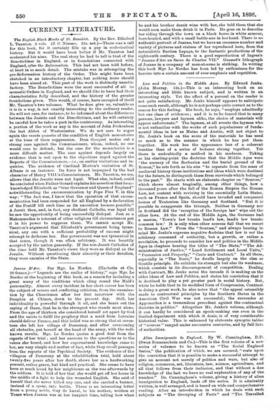CURRENT LITERATURE.
The English Black Monks of St. Benedict. By the Rev. Ethelred L. Taunton. 2 vols. (J. C. Nimmo. 21s. net.)—There was a call for this book, for it certainly fills up a gap in ecclesiastical history. But it would have been better if Mr. Taunton had moderated his aims. The real story he had to tell is that of the Benedictines in England, or in foundations connected with England, after the Reformation. This had not been told before, at least in so much detail. The mistake was in attempting the pre-Reformation history of the Order. This might have been sketched in an introductory chapter, but nothing more should have been aimed at. This part of the work is distinctly unsatis- factory. The Benedictines were the most successful of all he monastic Orders in England, and we should like to have had their characteristics fully described, and the history of the greater foundations given. This would, of course, have occupied of itself Mr. Taunton's two volumes. What be does give us, valuable as it is in a way, is not exactly interesting to the ordinary reader. He will not care, for instance, to be informed about the differences between the Jesuits and the Benedictines, and he will certainly be careful how he takes a part in the controversy. As interesting a portion of the work as any is the account of John Feckenham the last Abbot of Westminster. We do not care to argue again the secede quaestio of the condition of English monasteries at the time of their suppression. Dom Gasquet makes out a strong case against the Commissioners, whom, indeed, no one would care to defend; but the case for the monasteries is a more difficult matter. The case against depends largely on evidence that is not open to the objections urged against the Reports of the Commissioners,—i.e., on earlier visitations and in- quiries. The evidence of Cardinal Morton's visitation of St. Albans is an instance. Ha force is not impugned by the bad character of Henry VIII.'s Commissioners. Mr. Taunton, we see, allows that the Jesuits were not loyal. What else, indeed, could be concluded when Father Gerard explains his assertion that he ac- knowledged Elizabeth as "true Governor and Queen of England" notwithstanding the excommunication by Pope Pins V. in this way: "The fact was, I knew that the operation of that excom- munication had been suspended for all England by a declaration of the Pontiff till such time as its execution became possible." A Jesuit then, and, in fact, any obedient Catholic, was loyal till he saw the opportunity of being successfully disloyal. Just so a Mahommedan is tolerant of other religions till circumstances put it in his power to suppress them. We cannot accept Mr. Taunton's argument that Elizabeth's government being tyran- nical, any one with a sufficient probability of success might attempt to dethrone her. Her government was not tyrannical in that sense, though it was often arbitrary. It was heartily accepted by the nation generally. If the non-Jesuit Catholics of the time held Mr. Taunton's views they were as disloyal as the Jesuits. Without questioning their sincerity or their devotion, they were enemies of the State.


































 Previous page
Previous page